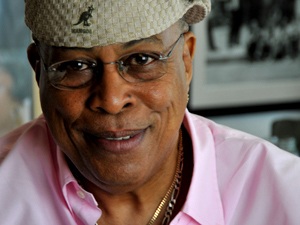Fuse Jazz Review: The Dean of Latin Jazz Comes to Boston
Chucho Valdés moved almost seamlessly from African-Cuban rhythms and chants in Yoruba or Spanish to a hip, modern jazz style. The latter, paradoxically, owes much to the brilliant runs and glissandi of Art Tatum, the bluesiness of Horace Silver, and the power of the left hand chords of McCoy Tyner.
The Chucho Valdés Quintet. Presented by the Celebrity Series of Boston. At the Berklee Performance Center, Boston, MA, November 29.
By Michael Ullman.
Many of us remember the astonishing advent of the all-star, Cuban group Irakere, who appeared at the Montreux Jazz Festival in 1979 playing an energized, virtuosic, rhythmically powerful music that no one who had not been to Cuba could have anticipated. Pieces like the three part Missa Negra are based on what they call their “original rhythms,” African beats modified and intensified by generations of trained, Cuban musicians. This band drew on a rich mix of influences and styles besides the tradition of African drumming: they were all trained in classical music, in Cuban folk music, and in what they had heard of jazz. Missa Negra begins in a wash of percussion, whoops from the band, before the settled theme stated by alto saxophonist Paquito D’Rivera.
Its composer was Chucho Valdes, who came to the Berklee Performance Center on for a single long set and two stirring encores. In his well-organized performance—his musicians watch him like hawks—Valdés moved almost seamlessly from African-Cuban rhythms and chants in Yoruba or Spanish to a hip, modern jazz style. The latter, paradoxically, owes much to the brilliant runs and glissandi of Art Tatum, the bluesiness of Horace Silver, and the power of the left hand chords of McCoy Tyner.
But there’s more. Two thirds of the way through the evening’s long set, Valdés featured bata drummer Dreiser Durruthy Bombalé in a piece that began with chanting and that ended with the whole group—three percussionists, bass, and Valdés—rocking complex rhythms suggested on the bata drums. Valdés then took over with a quiet glissando on piano, leading to one of the many surprises of the evening—the pianist played a tender version of the main theme from Rimsky-Korsakov’s Scheherazade. (He had already quoted a Bach keyboard piece and in the next number would play a little of Ravel’s Rhapsodie espagnole.) The Scheherazade introduction, wholly satisfying in itself, nonetheless was converted by the pianist into a basic, 12-bar blues that might have come from Horace Silver but was played with increasingly intensity by the entire band.
The concert began modestly, as the portly, 71-year-old Valdés, dressed in black, strolled onto the stage and sat down at the piano for an extended, rambling solo that immediately demonstrated his agility at the piano, his range and power, whether playing rapid-fire, scurrying short phrases that darted like squirrels, extended tremolos, or bits of Earl Hines stride. That introduction moved into a rendition of Gershwin’s But Not for Me. At one point, Valdés played a tremolo in the right hand and improvised bluesy lines in the left. Later, he introduced several choruses of slow, triplet chords in the left hand that evoked 50’s clichés of native American music. Throughout there was an astonishing fluency in a succession of techniques.
Valdés also gave plenty of space to each of his accompanists, including drummer Rodney Yllarza Bareto. American jazz drummers find ingenious ways of not stating a beat. Bareto depended on a funky pattern he never changed, but he created surprising empty spaces simply by not playing for a measure or excising two or one beats. The funk remained, but some variety was wittily achieved. In the encore, bata drummer Bombalé, hitherto the most restrained of the musicians (he was the only one in tie and suit), suddenly turned into a cheerleader, directing the audience to clap and finally jumping into the delighted crowd to do a shoulder-shaking dance. It seemed an appropriate ending to a vigorous and challenging set that was always delightful and, at its best, enlightening.
Tagged: Berklee Performance Center, Chucho Valdés, Chucho Valdes Quintet

